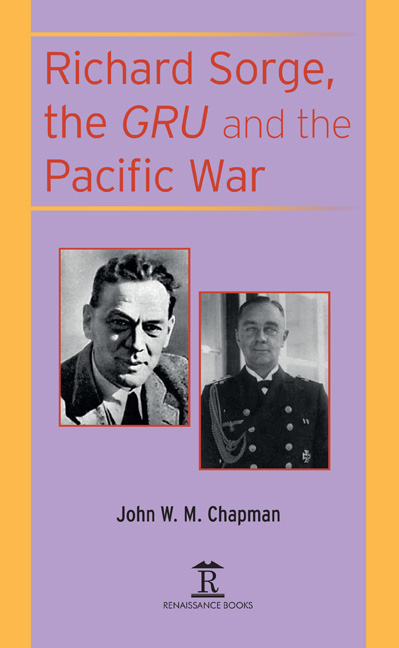Book contents
- Frontmatter
- Contents
- Chart: Organization of the People’s Commisariat for the Defence of the USSR,1941
- Preface
- Introduction
- Abbreviations
- List of Illustrations
- 1 ‘All is Not Well in the Camp of the Axis Powers’: Karl von Wiegand to Hearst Press, 20 November 1941
- 2 ‘In the Matter Affecting Ambassador Ott’
- 3 The Purge of German Journalists
- 4 ‘Expressions which are Psychologically Dangerous’: General Jodl to Admiral Wenneker 24.12.1942
- 5 The Bifurcation of Intelligence in Retrospect, 1929–1937
- 6 The Bifurcation of Intelligence in Retrospect, 1937–1941
- 7 Conclusions
- Select Bibliography
- Source Materials
- Index of Persons
- Index
- List of Contributors
- Frontmatter
- Contents
- Chart: Organization of the People’s Commisariat for the Defence of the USSR,1941
- Preface
- Introduction
- Abbreviations
- List of Illustrations
- 1 ‘All is Not Well in the Camp of the Axis Powers’: Karl von Wiegand to Hearst Press, 20 November 1941
- 2 ‘In the Matter Affecting Ambassador Ott’
- 3 The Purge of German Journalists
- 4 ‘Expressions which are Psychologically Dangerous’: General Jodl to Admiral Wenneker 24.12.1942
- 5 The Bifurcation of Intelligence in Retrospect, 1929–1937
- 6 The Bifurcation of Intelligence in Retrospect, 1937–1941
- 7 Conclusions
- Select Bibliography
- Source Materials
- Index of Persons
- Index
- List of Contributors
Summary
RESEARCH ON THIS subject area of relations between Germany and Japan in the first half of the twentieth century was initially begun in 1960, when a choice was being made of a doctoral degree topic for study at the University of Oxford. That it was a researchable topic was confirmed by the availability of verified primary evidence with reference to German military archives held at the US National Archives in Washington DC and diplomatic archives held in the Foreign Office Library in London. With the assistance of the Hon. Dr Margaret Lambert and Professor John Erickson, contact was made with Sir William Deakin and Professor Dick Storry at St Antony's College, Oxford, who were then preparing a monograph from German and Japanese source materials on the Sorge case.
Given the history of the racist fanaticism manifested in the inter-war era by the Nazi Party, the possibility of collaboration with non-Aryan societies was curious, at least superficially, and especially as there were numerous complaints voiced by individuals of Japanese nationality about their treatment on German streets in the early 1930s. Further researches in London, Washington and Tokyo in archives were accompanied by interviews and correspondence with a number of individual witnesses of events between 1930 and 1945. This period of research coincided with extensive press coverage of the trial of Admiral Paul Wenneker in Hamburg, which elicited strong denials of any intentional wrongdoing on the part of a personality whose whole career had hitherto been marked by a widespread recognition of his professional and personal integrity.
After his death in 1979, many of Wenneker's friends and colleagues continued to question the whole basis of the prosecution case and in the course of the publication of the first four volumes of the war diaries of successive German naval attachés in Japan, which had been obtained with the surviving records of the German Navy from Coburg by the British Admiralty in 1945, the family and many of these friends and colleagues kindly provided this author with access to reminiscences and photographs relevant to these years. In this phase of research, access was obtained rather slowly to many of the records which were not available to Wenneker's defence team in the 1960s, who helpfully permitted copies of all the defence documents to be made available to the author.
- Type
- Chapter
- Information
- Richard Sorge, the GRU and the Pacific War , pp. vii - xPublisher: Amsterdam University PressPrint publication year: 2020

